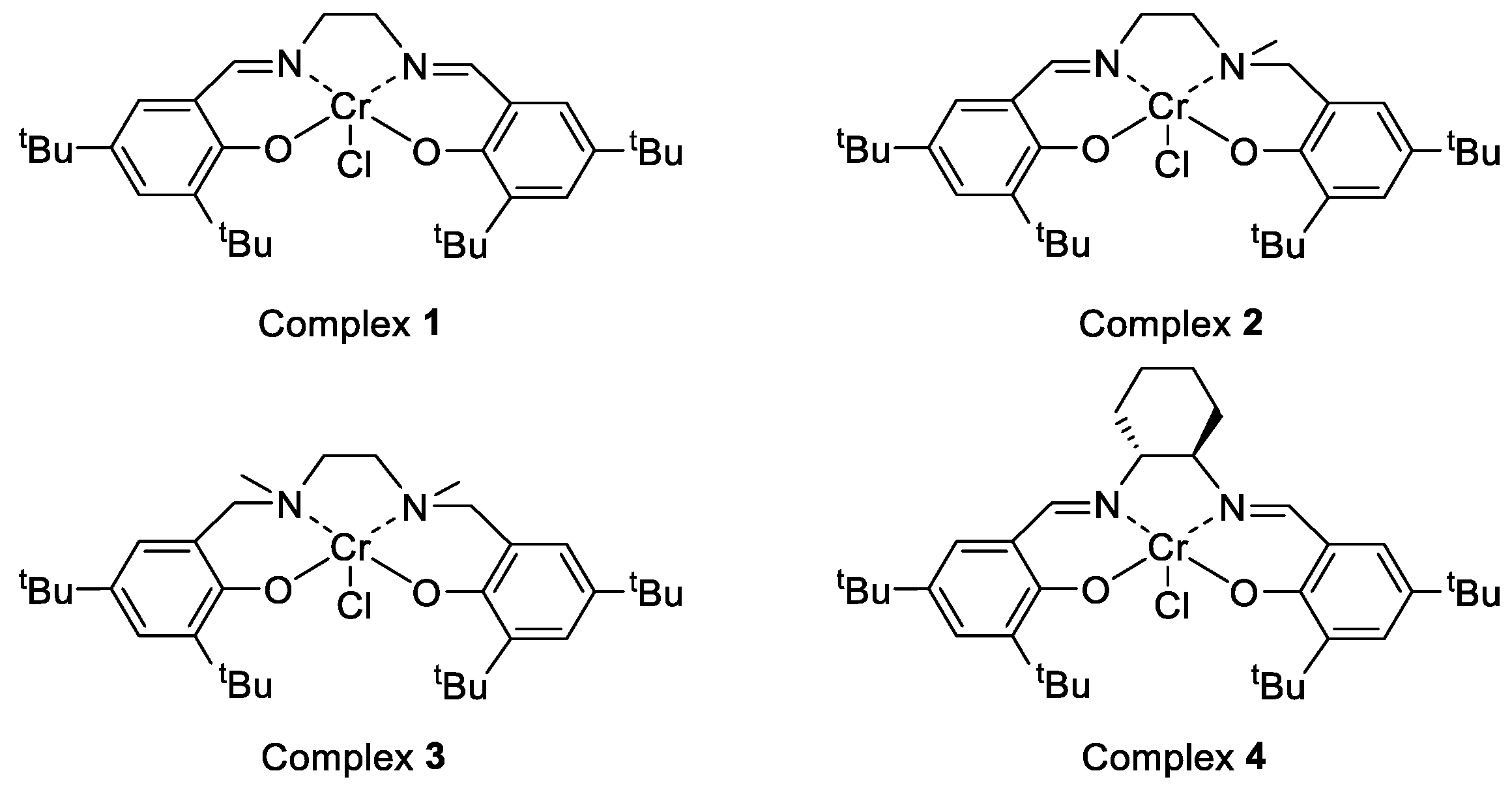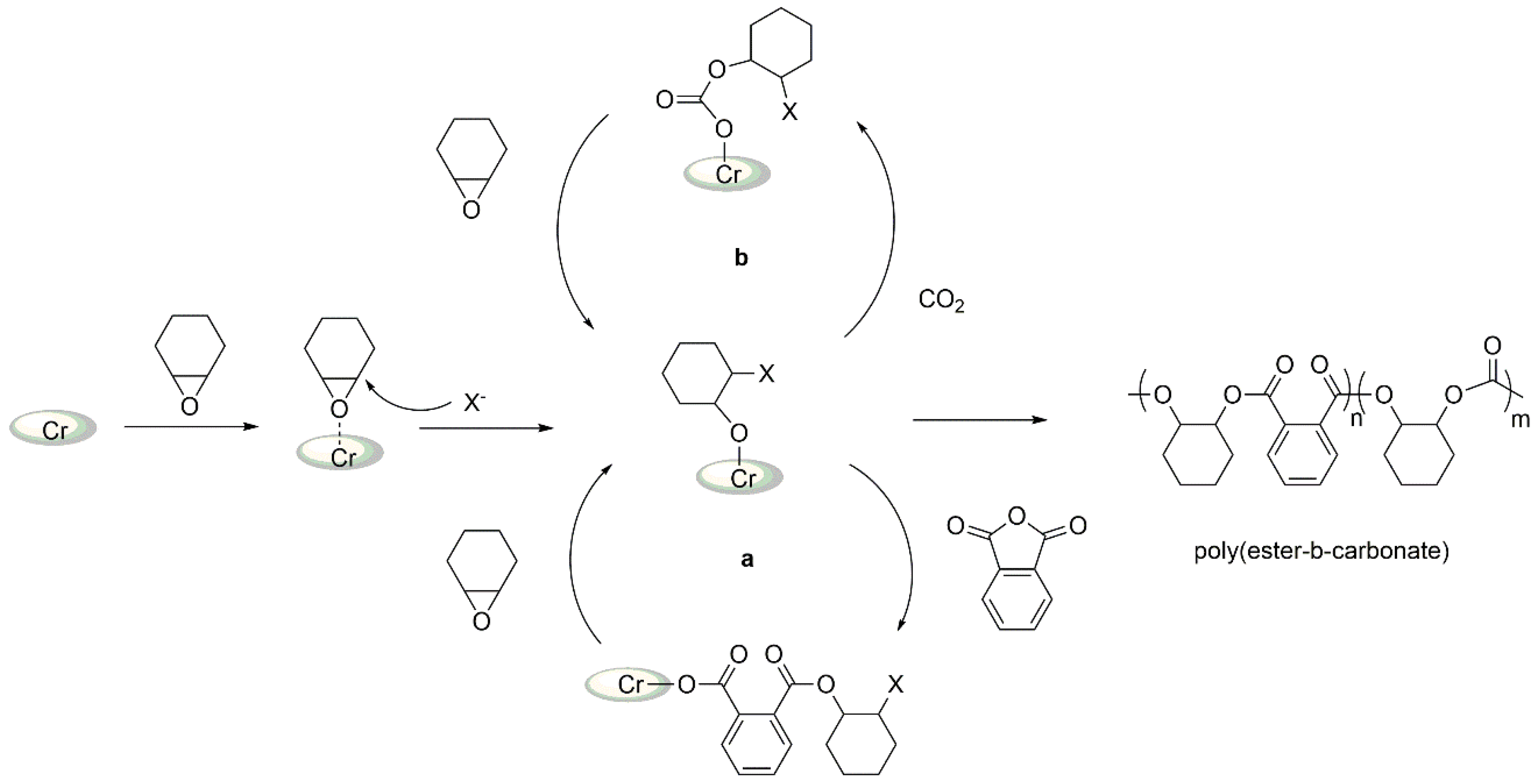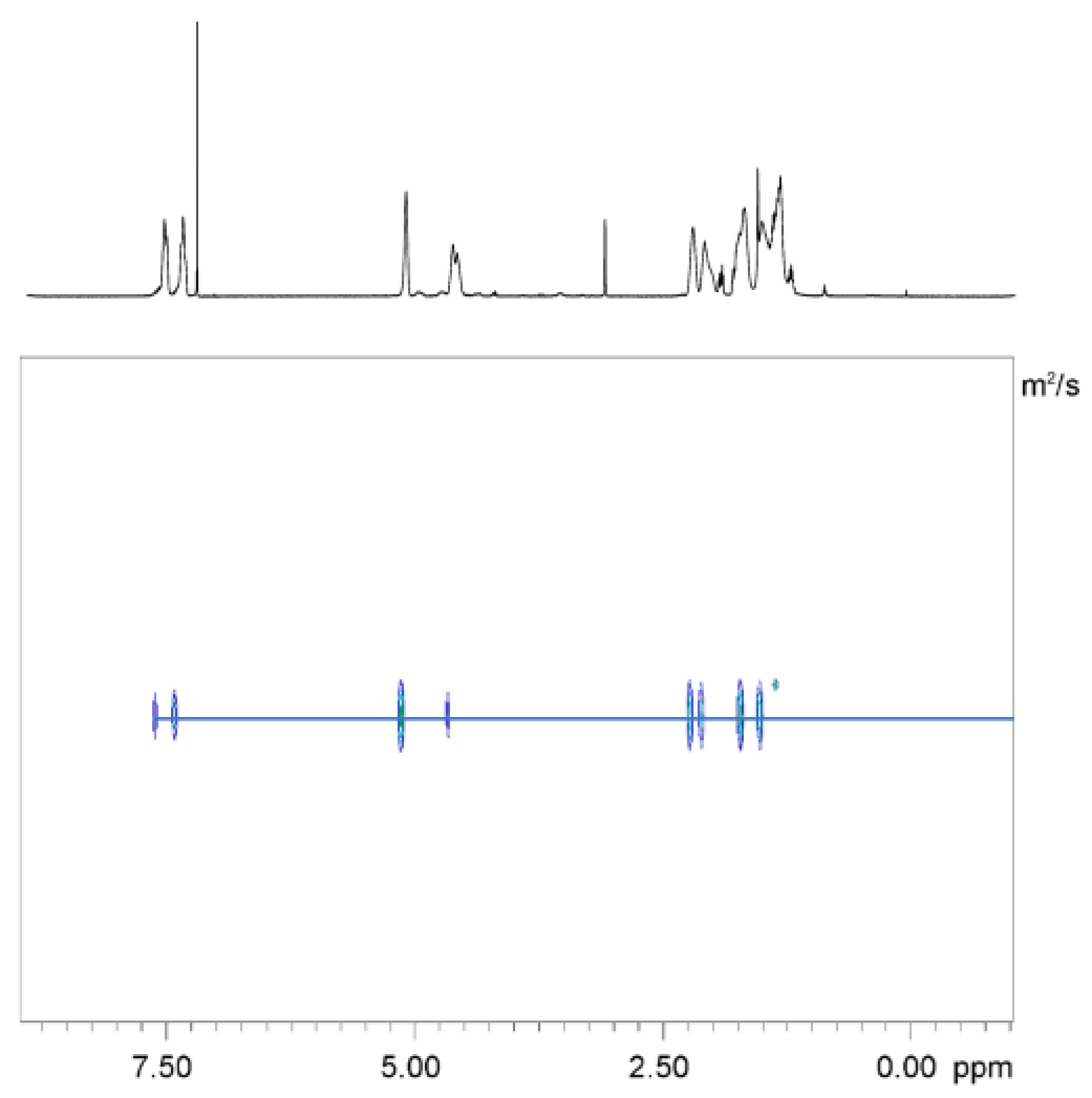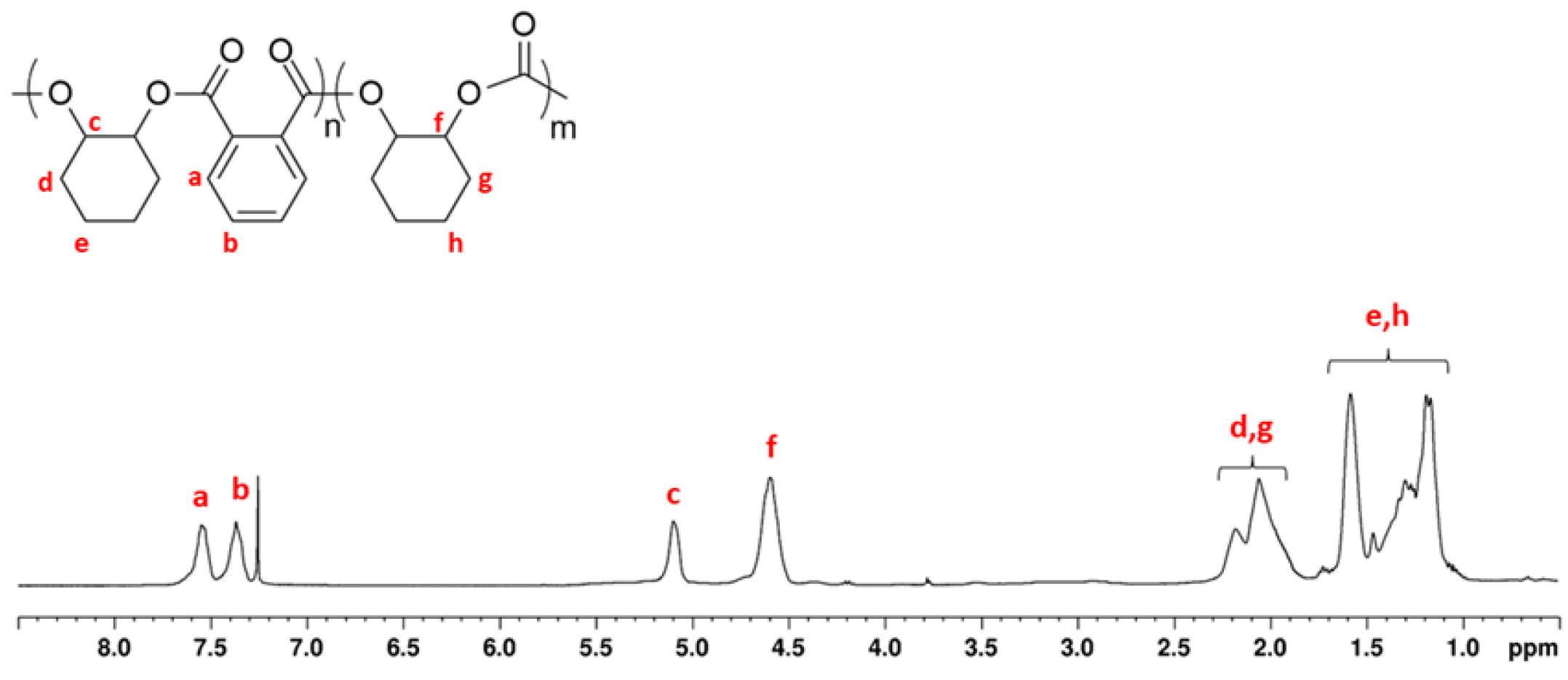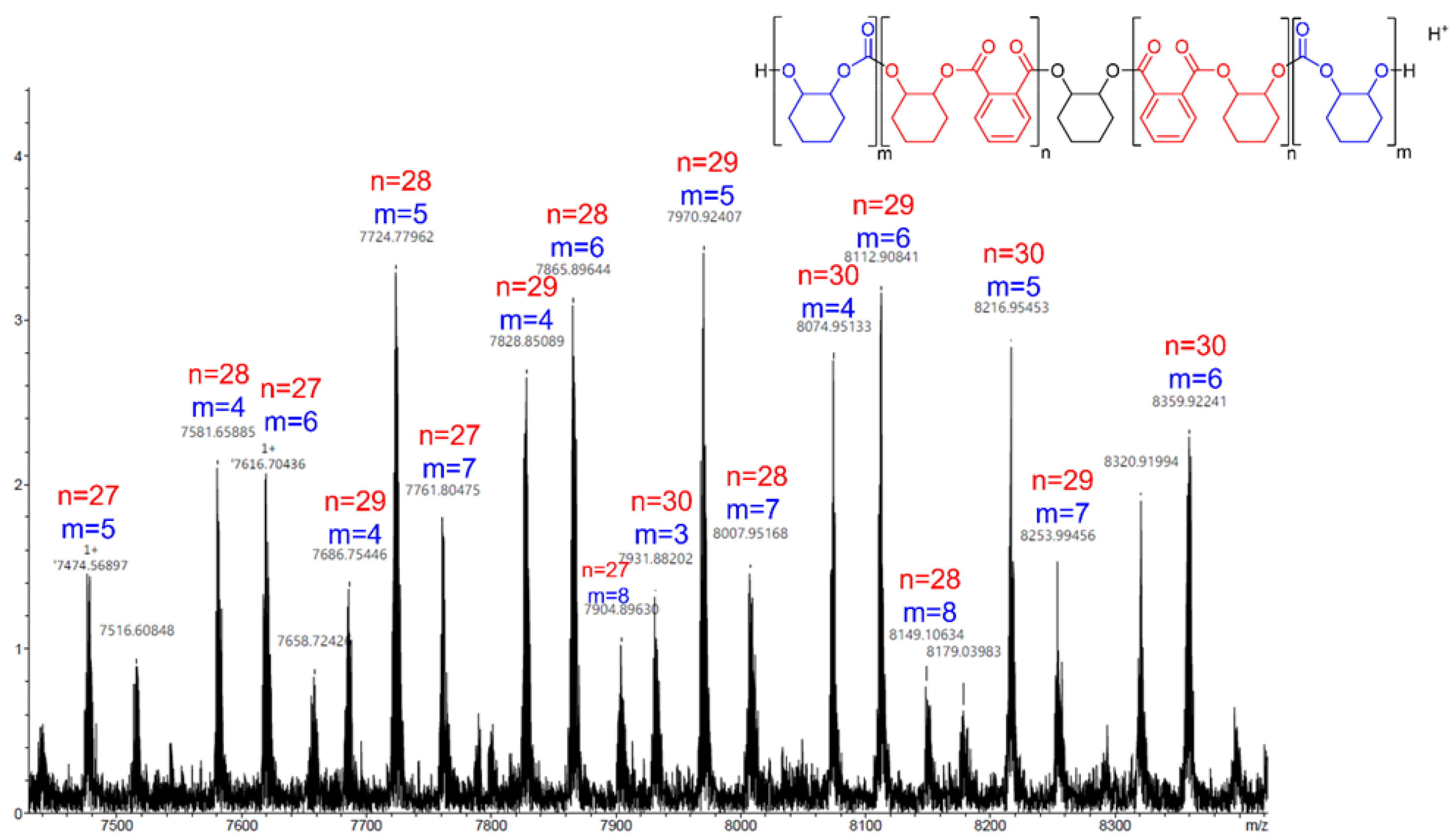Abstract
Salen, Salan, and Salalen chromium (III) chloride complexes have been investigated as catalysts for the ring-opening copolymerization reactions of cyclohexene oxide (CHO) with CO2 and of phthalic anhydride (PA) with limonene oxide (LO) or cyclohexene oxide (CHO). In the production of polycarbonates, the more flexible skeleton of salalen and salan ancillary ligands favors high activity. Differently, in the copolymerization of phthalic anhydride with the epoxides, the salen complex showed the best performance. Diblock polycarbonate-polyester copolymers were selectively obtained by one-pot procedures from mixtures of CO2, cyclohexene oxide, and phthalic anhydride with all complexes. In addition, all chromium complexes were revealed to be very active in the chemical depolymerization of polycyclohexene carbonate producing cyclohexene oxide with high selectivity, thus offering the opportunity to close the loop on the life of these materials.
1. Introduction
The current concerns about plastic pollution and the depletion of oil reserves are driving scientific research toward the development of more sustainable polymers [1,2]. In this context, aliphatic polyesters and aliphatic polycarbonates represent very promising alternatives to traditional plastics because of their general biocompatibility and agile hydrolytic degradation [3]. The ring-opening copolymerizations (ROCOP) of epoxides with CO2 or cyclic anhydrides are versatile methods for the synthesis of a wide range of polycarbonates [4] and polyesters [4,5].
Compared to the ring-opening polymerization (ROP) of lactones, the ROCOP of cyclic anhydrides and epoxides provides access to more structurally diverse polyesters, both aliphatic and semi-aromatic, thanks to the large variety of low-cost and commercially available monomers, in some cases obtained from renewable resources [6].
On its side, the ring-opening copolymerization of epoxides and CO2 allows the production of biodegradable and biocompatible polycarbonates, exploiting the CO2 as an abundant, inexpensive, safe, and renewable C1 source ensuring, at the same time, its fixation in durable materials [7,8,9,10,11].
New opportunities to amply the availability of advanced materials with hybrid and tunable properties are offered by the synthesis of polycarbonate-polyester block copolymers that conjugate the chemical properties of the related homopolymers into a single structure [12,13]. Generally, polycarbonate-polyester block copolymers are synthesized by sequential polymerization reactions and/or with macro-initiators. These methods require multistep processes in which tandem or multi-functional catalysis is involved, thus lacking extensive versatility [14].
In 2014, Williams reported the first example of “switch catalysis” for the selective production of diblock polycarbonate-polyester copolymers obtained from a mixture of caprolactone, cyclohexene oxide, and carbon dioxide by using a single homogeneous di-zinc catalyst [15]. Both kinetic and thermodynamic control by the metal-chain end group revealed to be responsible for the selectivity of the process in which the catalyst switches from a polymerization cycle to another depending on the nature of the propagating species. Subsequently, Rieger and co-workers obtained diblock/random copolymers from β-butyrolactone, cyclohexene oxide, and carbon dioxide by using a di-zinc β-diiminate catalyst [16].
In the last few years, Williams and other authors demonstrated the generality of switch catalysis and its applicability beyond zinc complexes, and interesting results have been obtained with catalysts based on different metals [13,17,18], such as chromium [19] and aluminum [20,21,22]. Among the catalysts studied for both reactions, as well as their combination, metal complexes bearing salen-type ligands have demonstrated very good performances in terms of activity and selectivity [23,24,25,26]. In particular, salen-based chromium complexes, in combination with anions derived from PPN+ salts, are among the most effective and robust catalysts for the ring-opening copolymerization of CO2 with epoxides [27,28]. Salen derivatives such as salan and salalen have also been tested as ancillary ligands for chromium complexes as catalysts in this class of reactions [7]. In the copolymerization of cyclohexene oxide (CHO) and CO2, salanCr complexes [29] showed a higher activity with respect to their salen counterparts by using PPNN3 as a co-catalyst. Later on, half-reduced salalen complexes in combination with PPNCl showed excellent activity in the production of PCHC, even under mild conditions [30]. In both cases, the high activity was attributed to the higher coordination flexibility of the salan and salalen systems with respect to the rigid salen-based complexes, resulting in a higher tendency to form metal complexes where nitrogen and oxygen donor atoms occupy three equatorial and one axial coordination sites [31].
In the copolymerization of epoxides with cyclic anhydrides, salen chromium catalysts have been largely investigated, showing very good performances [32,33,34,35]. A substantial influence of ligand structure was highlighted by several authors [36,37,38,39]. Differently, the related salan and salalen derivatives have been rarely explored in these reactions [40,41]. In the switch catalysis from monomer mixtures comprising epoxide, anhydride, and lactone or CO2, ABA triblock polyesters have been synthesized using a commercially available chromium catalyst [19,42] and sophisticated binuclear chromium complexes [37,38].
Considering that chromium complexes are among the catalysts that show the best performances in the cited catalysis, and well aware that even subtle modifications of several parameters (such as ligand substitutions, labile ligands on the metal, co-catalysts, reaction conditions, etc.) may cause dramatic influences on activity and/or selectivity of the catalytic systems [43], we decided to synthesize salen, salan, and salalen ligands with the same substituents on the phenolate moieties and the same bridge between the nitrogen atoms [44]. Then the corresponding chromium chloride complexes were prepared following the same procedure [31] and tested as catalysts for the ROCOP of CHO with CO2 under the same conditions. Subsequently, we explored the behavior of the chromium complexes in the copolymerization of phthalic anhydride (PA) with two different epoxides, CHO and limonene oxide (LO), for the synthesis of polyesters. Moreover, diblock polyester/polycarbonate polymers were prepared by chemoselective polymerization of CHO, CO2, and PA. For each polymerization reaction, the commercial salCyCrCl complex 4 was tested for comparison under the same reaction conditions. Finally, the synthesized chromium complexes have been used to promote the depolymerization of the polycarbonates, thus highlighting the degradability of these materials and, at the same time, the versatility of these catalysts.
2. Results and Discussion
2.1. Synthesis and Charactherization of Chromium Complexes
Chromium complexes 1–3 were synthesized according to a previously reported procedure [31]. The opportune proligand and one equivalent of chromium (II) chloride CrCl2 were dissolved in THF, and the solution was stirred at room temperature in a nitrogen atmosphere for 24 h (Scheme 1). After this time, the solution was exposed to the air for two hours to allow the oxidation of chromium (II) to chromium (III). The desired complexes were obtained by extraction with diethyl and a saturated solution of NaCl. The organic phase was dried with Na2SO4, filtered, and the solvent was removed in vacuo. In Scheme 2, the structures of complexes 1–3 are detailed, and the structure of the commercial complex 4 is also reported for comparison.

Scheme 1.
Schematic pathway for the synthesis of complexes 1–3.
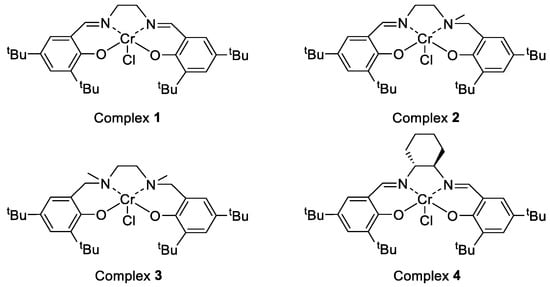
Scheme 2.
Chromium complexes 1–4 studied in the present work.
Complexes 1 [45,46], 2 [30], and 3 [29] have been previously reported in the literature, although a full characterization has never been described. The paramagnetic complexes were firstly analyzed by matrix-assisted laser desorption/ionization time-of-flight mass spectral (MALDI-ToF MS) (Figures S1–S3 in the ESI).
For the salen- and salan-chromium complexes, the most intense peak was attributable to the species formed after the loss of one chloride. Interestingly, for the salalen-chromium complex, the higher peak corresponded to the species formed after the loss of the chloride and the coordination of one oxygen molecule [47].
Complexes 1–3 were then analyzed by UV-visible spectroscopy, and their spectra were compared to those of the free ligands (Figure 1). Samples were dissolved in acetonitrile (80 µmol), and the absorbance was recorded from 200 to 800 nm (Figures S4–S6 in the ESI). Indicative of the formation of the desired chromium complexes, phenolate ligand-to-metal charge-transfer (LMCT) transitions were observed; these bands appeared at lower energies and with lower intensities with respect to the bands also found in the spectra of the corresponding free ligands and attributable to the π → π* transitions of the phenolic chromophores. In particular, the LMCT bands were observed at 416, 432, and 569 nm, respectively, for complexes salalenCrCl 2, salenCrCl 1, and salanCrCl 3.

Figure 1.
Electronic absorption spectra of complexes 1–3 and the related ligands in acetonitrile.
The accomplishment of the ligands coordination to the chromium metal was further substantiated by IR characterization (IR spectra of ligands and complexes 1–3 are reported in Figures S7–S9 in the ESI). In fact, in the spectra of each complex, there appeared two peaks around 550 and 490 cm−1, indicative of the M–N and M–O bonds, respectively.
Finally, the magnetic susceptibility data for complexes 1–3 were determined at room temperature by the Evans NMR method by using C6D6 as a solvent and cyclohexane as a diamagnetic reference. The magnetic moments of the complexes were in the range of 3.06–3.15 and thus close to the spin-only value of 3.99 μB for S = 3/2, indicating the formation of high-spin Cr(III) complexes.
2.2. Copolymerizations of CO2 with Cyclohexene Oxide (CHO)
First, we explored the behavior of complexes 1–4, in combination with PPNCl as cocatalyst, in the copolymerization of CO2 with CHO (Scheme 3), performed at a cyclohexene oxide/catalyst/cocatalyst ratio of 1000:1:1, under 13 bar of CO2 pressure and at a temperature of 70 °C without using any solvent (Table 1 and Table S3 in the ESI).

Scheme 3.
Copolymerization of CHO and CO2 promoted by complexes 1–4.

Table 1.
CHO/CO2 copolymerization promoted by complexes 1–4.
As depicted in Scheme 4, the copolymerization initiates with the activation of the epoxide by coordination to the Lewis acidic metal center, and the following nucleophilic attack of the initiating species X (e.g., the chloride ion from PPNCl) ring-open the monomer. The resulting metal alkoxide inserts a CO2 molecule (pathway b in Scheme 4), generating a metal carbonate. Therefore, the cycle propagates by alternate repetitions of CHO and CO2 insertions, leading to the formation of the polycarbonate products.
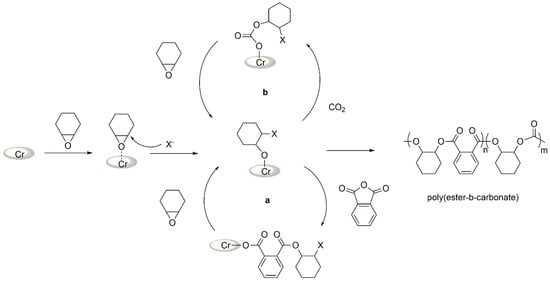
Scheme 4.
Proposed mechanisms occurring during polymerization of cyclohexene oxide with CO2 and/or phthalic anhydride.
For a coherent comparison, substrates with the same degree of purity and the same equipment were used for all experiments.
After 3 h, the product mixtures were analyzed by 1H NMR spectroscopy, with the quantities of polycyclohexene carbonate (PCHC), ether linkages in the PCHC, and CHO determined by integrating the resonances at 4.60, 3.45, and 3.11 ppm, respectively (see Figure S12 in the ESI). Worth noting, negligible quantities of ether linkages (<0.3%) were observed in each sample, highlighting the formation of completely alternating copolymers of CHO and CO2 with no homopolymerization of CHO. In addition, chromium complexes 1–3 result in high selectivity towards the formation of the polymeric product; in fact, no signals due to cyclic carbonates (either cis- or trans-cyclohexene carbonates) were detected in any case.
The conversion values indicated the order of activity: salalenCrCl 2 > salanCrCl 3 > salenCrCl 1 (compare entries 1–3 in Table 1), thus corroborating the previously stated notion that the greater flexibility of (half-) reduced ligands favors the activity of the corresponding complexes. In addition, the comparison of the two salen-based complexes 1 and 4 (compare entries 1 and 4, respectively, in Table 1) suggested that the cyclohexyl backbone favors the activity of the catalytic system with respect to the ethylene bridge.
The molecular weights of the copolymers were determined by gel permeation chromatography (GPC) in THF solution using a RI detector and polystyrene standards. Peak profiles of GPC of the resulting copolymers were bimodal, and the number-average molecular weights of the copolymers were smaller than the theoretical values; this is quite common in this kind of polymerization reactions, and it is generally ascribed to the occurrence of chain-transfer reactions promoted by contaminant water or attributable to the presence of cyclohexan-1,2-diol (CHD, produced by hydrolysis of CHO). However, molecular-weight distributions were relatively narrow (Ɖ = 1.17 ÷ 1.25), suggesting that the chain-transfer reactions were reversible and fast [48].
In addition to the main signals for the protons of the PCHC chains, the 1H NMR spectra of the polymer samples showed two peaks at 3.60 and 4.45 ppm, indicative of the formation of the cyclohexanol end group, which can be generated by hydrolysis in the termination stage of the polymerization.
The structural information of the obtained PCHC samples was also obtained by MALDI-ToF high-resolution MS. In particular, the MALDI-ToF spectrum of the sample obtained in entry 3 showed the presence of one major distribution separated by 142.06 Da, which is the mass of the polymer repeating unit, and centered around 6100 Da, in good agreement with molecular weights obtained by GPC (see Figures S17 and S18 in the ESI). The peak appearing at m/z 5956 can be closely matched with the calculated molecular weight of 40 repeating units of PCHC possessing a chloride group at the α-chain end and a hydroxyl group at the ω-chain end, suggesting the initiation reaction from a chloride (reasonably deriving from the initiator, PPNCl, see Scheme 4), and supporting the termination reaction by hydrolysis, as already suggested by the NMR analysis.
The signals observed in the carbonate region of the 13C NMR spectrum of the PCHC copolymer obtained by complex 4/PPNCl indicated an atactic structure despite the chiral nature of the complex. This result was previously reported by Darensbourg working with complex 4 and N-methylimidazole as cocatalyst [49], under different reaction conditions, suggesting that the ability of this complex to exert stereocontrol does not depend on the reaction conditions.
DSC analysis of polycarbonates obtained in runs 1–4 allowed us to identify their glass transition temperature (Tg). The DSC thermograms (see Figure S26 of the ESI for a representative example) show Tg values of 120.92 °C, 111.11 °C, and 121.83 °C for entries 2, 3, and 4, respectively, in line with the values reported in the literature for completely alternating PCHC samples with different molecular weights [43].
Subsequently, the thermal decomposition of PCHC samples was studied by thermal gravimetric analysis (TGA). For PCHC samples reported in Table 1, the onset decomposition temperatures Td (defined by the temperature of 5% weight loss) were in the range 219–248 °C (see Figure S23 for a representative example).
2.3. Copolymerization of Cyclohexene Oxide (CHO) and Limonene Oxide (LO) with Phthalic Anhydride (PA)
Subsequently, catalysts 1–4, in combination with the cocatalyst PPNCl, were tested for the copolymerization of phthalic anhydride (PA) with cyclohexene oxide (CHO) or limonene oxide (LO) (Scheme 5).

Scheme 5.
Copolymerization of PA with CHO or LO.
Both PA and CHO are commercial chemicals used at scale in the polymer industry. Currently, they are produced from petroleum derivatives; however, alternative synthetic strategies from biomass have been individuated: CHO can be obtained from 1,4-cyclohexadiene, a waste product of plant oil self-metathesis [50], and PA from agricultural residue [51].
Differently (R)-limonene oxide (LO) is a bioderived monomer, naturally occurring as a mixture of cis and trans isomers, which is extracted from waste citrus fruit peel [52], thus polymers obtained from LO are bioderived materials [53,54,55,56].
All PA/CHO polymerizations were performed at 70 °C with a single equivalent of PPNCl and in the presence of an excess of CHO to avoid the use of solvent (Table 2 and Table S1 in the ESI). The initial molar ratios of the comonomers and the complexes were [PA]0:[CHO]0:[Cr]0:[PPNCl]0 = 1000:100:1:1 when using CHO as an epoxide, and [PA]0:[LO]0:[Cr]0:[PPNCl]0 = 1000:500:1:1 for the copolymerization with LO.

Table 2.
Copolymerizations of PA with CHO or LO promoted by 1–4.
The mechanism of the ROCOP of epoxides with anhydrides is similar to that previously described for the ROCOP of epoxides with CO2. The initiation step consists in the nucleophilic attack by the initiator on a CHO unit followed by the insertion of the anhydride to generate the related carboxilate derivative. The alternate insertions of the two monomers allow the formation of the polyester chain (Scheme 4, pathway a).
The monitoring of the conversion of the phthalic anhydride versus time and the selectivity of the reaction (expressed as the content of ester linkages in the polymer chain) were evaluated by 1H-NMR spectroscopy. The molar masses of the obtained polyesters and their dispersities were determined by GPC analysis using polystyrene standards.
In the ROCOP of PA with CHO, the Salen-Cr complex (1) revealed itself to be the most active catalyst, showing, after 30 min, a conversion almost quantitative (93%) of PA (entry 1, Table 2). After the same reaction time, significantly lower reactivities were observed with the Salalen-Cr and Salan-Cr complexes (46% and 31%, respectively; entries 2 and 3, Table S1); however, for both complexes, almost quantitative conversions were obtained only after 1 h (entries 2 and 3, Table 2).
The activity of the Salen-Cr complex was comparable to that reported for the Salen-Cr bearing a cyclohexyl−diimine backbone [39] (complex 4), although more drastic reaction conditions were used (T = 130 °C), and much higher than that of the salophen chromium (III) complex, for which a conversion of PA of around 4% was achieved after 60 min [34]. In both cases, the complexes were activated by DMAP (4-dimethylaminopyridine).
For a more coherent comparison, a polymerization test was performed with 4 in the presence of PPNCl, obtaining a conversion analogous to that of complex 1 (compare entries 4 and 1, Table 2). This is evidence that the nature of the cocatalyst has a more significant influence on the catalytic activity than the backbone skeleton of the ancillary ligand.
In the copolymerization of PA with LO, the same trend of activity was observed with the salen complex, which showed the highest activity, allowing the conversion of 63% of the phthalic anhydride after 15 min (entries 5–7, Table 2 see also Table S2 in the ESI). These activities were higher than those observed with salen aluminum complexes [57] or with a salophen chromium complex [56]. However, the best performances were obtained with the commercial chromium complex 4 (entry 8, Table 2).
Both copolymerizations proceeded in an exclusive alternating fashion with ester linkage content > 99%, as evident by the 1H NMR spectra of polycyclohexene phthalate and polylimonene phthalate that showed perfectly alternated microstructures in which no polyether sequences were detected (Figures S10 and S11).
The average molecular weight values (Mn) measured by GPC (without any calibration correction) were lower than the theoretical ones expected for a living system. This result is frequently observed in this catalysis as a consequence of the presence of protic impurity traces (small amounts of hydrolyzed anhydrides or cyclohexene oxide) that can act as chain transfer agents [34,58,59], as previously discussed for the copolymerization of CHO with CO2. These copolymerization processes are susceptible to rapid displacement of the growing polymer chain by protic species; thus, the new metal-alkoxide or hydroxide bond formed can initiate a new polymer chain, leading to shorter molecular weight polymers.
This behavior could also explain the profile of the GPC curves, in which a peak related to a second and less abundant distribution is evident (Figures S15 and S16).
The glass transition temperatures fall in the range between 122 °C and 104.9 °C, values coherent with those reported in the literature for alternating CHO/PA and LO/PA polyesters, respectively (Figures S24 and S25) [34]. The thermal decompositions of polyesters were studied by TGA (Figures S20 and S21 of the ESI).
2.4. Terpolymerization of Cyclohexene Oxide (CHO) with Phthalic Anhydride (PA) and CO2
Once the activities of all the systems in the two different ROCOPs were evaluated, we tested their performance in the synthesis of polyesters/polycarbonates diblock by combining the two processes (Scheme 4 and Scheme 6).

Scheme 6.
Terpolymerization of PA with CHO and CO2.
The reactions were conducted at 70 °C with a CHO:PA:cat:PPNCl ratio of 1000:100:1:1 under 13 bar of CO2 pressure. The reaction conditions were analogous to those used for the related copolymerizations. Representative results are described in Table 3 and Table S4 in the ESI. After 3 h, an aliquot of the reaction mixture for each terpolymerization was examined by 1H NMR spectroscopy, revealing, in all cases, the complete consumption of the PA. This is coherent with that observed by Darensbourg for the terpolymerization of CO2/PA/CHO promoted by complex 4, in which the formation of the polycarbonate block occurs only after the complete consumption of the anhydride (see Scheme 4) [42].

Table 3.
PA/CHO/CO2 terpolymerization promoted by complexes 1–4.
The microstructures of copolymers were examined by 13C{1H} NMR spectroscopy, which showed only signals relative to the two blocks with no additional signals, and by DOSY NMR spectra (Figure 2 and Figure S14 of the ESI) showing a single diffusion coefficient for all signals (entry 2 of Table 3). Both data are consistent with the formation of diblock polyester/polycarbonate copolymers.
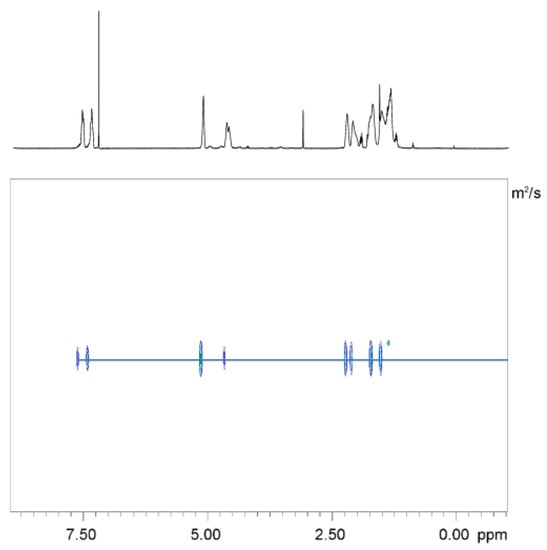
Figure 2.
2D DOSY NMR (600 MHz, CDCl3, 298 K) of poly (cyclohexene phthalate-block-cyclohexene carbonate) (entry 2 in Table 3).
The 1H NMR spectra allowed us to calculate the relative lengths of the two blocks that were consistent with the activities observed for the four catalysts in the two copolymerization processes. The 1H NMR spectrum of an isolated diblock coplymer is reported as a representative example in Figure 3 and Figure S13 of the ESI.
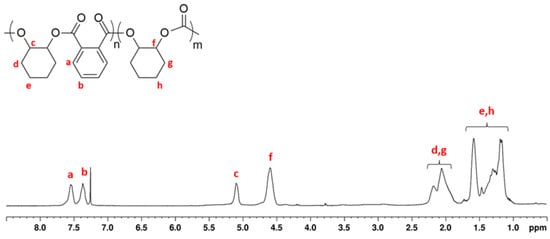
Figure 3.
1H NMR spectrum (400 MHz, CDCl3 and 298 K) of poly(cyclohexene phthalate-block-cyclohexene carbonate) obtained from a mixture of PA, CHO, and CO2 (entry 2 in Table 3).
The GPC analysis of the isolated copolymers (Figure S16) exhibited Mn values consistent with the sum of contributions related to the two component blocks. The distributions showed the same shape observed for the related PCHC and narrow dispersities Đ < 1.25.
In the MALDI-TOF spectra of the diblock copolymers, different distributions were evident. For the sample of entry 2 of Table 3, in the first series, centered at 4500 m/z, two families of peaks were detected corresponding to Cl or OH end-capped chains in which CHO-PA sequences are directly joined to PCHC sequences. A distribution centered at 8000 m/z described di-block structures in which perfectly alternated CHO-PA units were joined to sequences of PCHC by isolated cyclohexene oxide units (Figure 4).
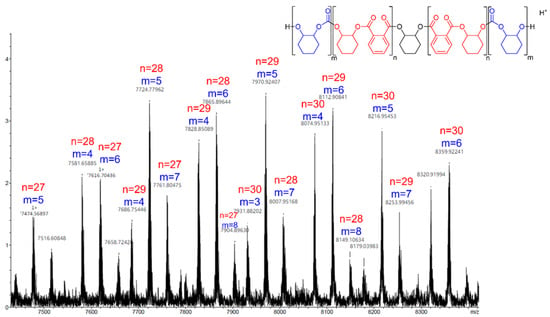
Figure 4.
Expanded MALDI-ToF spectrum ranging from 7400 to 8500 m/z of the poly (cyclohexene phthalate-block-cyclohexene carbonate) obtained in entry 2 of Table 3.
The thermal performances of the obtained poly-(ester-b-carbonate)s were studied by DSC and thermogravimetric analysis (TGA). These exhibit glass transition temperatures (Tg) around 116 °C (Figure S27), a value a little lower than the Tg of PCHC, and good thermal stability with a Td (5%) > 230 °C (Figure S22).
2.5. Chemical Depolymerization of PCHC
Chemically recyclable polymers that degrade into the corresponding monomers or other chemicals are emerging as strategic materials to reduce the impact of plastic pollution on the environment [60,61]. Recently, about the depolymerization of polycarbonates [62,63], Lu, Liu, and coworkers reported the depolymerization of PCHC promoted by metal (III) complexes bearing salen-based ligands [64]. Among them, the commercial chromium complex 4, in combination with PPNN3, exhibited high efficiency and selectivity in the depolymerization of different polycarbonates.
In light of these intriguing results, in this work we decided to verify the ability of chromium complexes 1–3 to promote the depolymerization reactions of polycyclohexene carbonates (Table 4 and Table S5 in the ESI).

Table 4.
Depolymerization of poly (cyclohexene carbonate), PCHC, using chromium complexes 1–3.
The most abundant PCHC sample (obtained in entry 2 of Table 1), whose thermal stability had been evaluated by TGA analysis (Td = 248 °C), was used to compare the performance of the synthesized complexes 1–3 in the depolymerization reactions (see Scheme 7), working under conditions similar to those explored by Lu [64]. Operating in bulk at 190 °C with 0.2 mol % catalyst loading and one equivalent of PPNCl (entry 1, Table 4), salanCrCl complex 1 promoted the almost full depolymerization of the PCHC sample (94% of conversion) with a selectivity of 97% versus the monomer (CHO) in only ten minutes.

Scheme 7.
Chemical recycling of PCHC in the monomer (CHO) and in cyclic carbonates (cis- and trans-CHC).
Thus, we reduced the depolymerization time to five minutes and compared the behavior of complexes 1–3 under the same reaction conditions (entries 2–4, Table 4). To our delight, all three complexes depolymerize the PCHC sample in CHO with high selectivity (95–96%), with the salen complex 1 showing the highest activity (75% of conversion), followed by salalen complex 2 (56%), and then by the salan complex 3 (12%).
The observed differences among the three catalysts are quite significant and, at the same time, quite unexpected, considering that subtle variations of the complex structures do not tend to play a role in catalyst activities when operating under such harsh conditions.
Finally, a depolymerization test of the poly-(ester-b-carbonate) was also performed (entry 5, Table 4). After five minutes, a depolymerization of 12% of the polycarbonate block was observed, while the polyester portion remained intact.
In their paper, Lu and collaborators suggest a two-step process in which the polymer is first converted into trans-CHC and then subsequently into CHO, assuming that the catalyst plays a role in both steps; however, no type of interaction between the metal and the polymeric chain is proposed. Thus, our interesting results definitely need more in-depth mechanistic studies, which will certainly be conducted in due course.
3. Materials and Methods
3.1. Reagents and Methods
All the operations of synthesis and handling of air-sensitive chemicals were performed in an inert atmosphere, using Schlenk techniques and/or a glove box in a nitrogen atmosphere. The used glassware was dried in an oven at 120 °C and subsequently subjected to vacuum-nitrogen cycles. Benzene, hexane, and toluene (Sigma-Aldrich, St. Louis, MO, USA) were distilled under nitrogen over sodium benzophenone. Deuterated solvents were purchased from Sigma-Aldrich and dried over activated 3-Å molecular sieves prior to use. All the reagents used for the synthesis of the complexes and the lactide were purchased from Sigma-Aldrich.
3.2. Instruments
The NMR spectra were recorded with BRUKER ADVANCE instruments operating at 600, 400, and 300 MHz for 1H. Chemical shifts (δ) are expressed in parts per million and coupling constants (J) in hertz. 1H NMR spectra are referenced using the residual solvent peak, δ = 7.27 for CDCl3. 13C NMR spectra are referenced using the residual solvent peak at δ = 77.23 for CDCl3. The measurement of diffusion has been carried out by observing the attenuation of the NMR signals during a pulsed field gradient experiment using the double-stimulated echo pulse sequence. In particular, 2D DOSY PGSE NMR spectra were performed on a Bruker Avance 600 spectrometer at 298 K without spinning.
The molecular masses (Mn and Mw) and their dispersities (Mw/Mn) were measured by gel permeation chromatography (GPC), using THF as the eluent (1.0 mL min−1), and narrow polystyrene standards were used as the reference.
MALDI mass spectra were recorded using a Bruker solariX XR Fourier transform ion cyclotron resonance (FT-ICR) mass spectrometer (Bruker Daltonik GmbH, Bremen, Germany) equipped with a 7 T refrigerated, actively shielded superconducting magnet (Bruker Biospin, Wissembourg, France). The samples were prepared at a concentration of 1.0 mg mL−1 in THF, while the matrix (DCTB) was mixed at a concentration of 10.0 mg mL−1.
The glass transition temperature (Tg) of the polymers was measured by differential scanning calorimetry (DSC) using a DSC 2920 apparatus manufactured by TA Instruments under a nitrogen flux of 50 mL min−1 with a heating and cooling rate of 10 °C min−1 in the range −10 to 200 °C. All calorimetric data were reported for the second heating cycle [65].
TGA analysis was performed with a Thermogravimetric analyzer (TGA) from TA Instruments: TGA Q500, Netzsch: TG 209 F1.
4. Conclusions
Salen-type chromium complexes supported by salen, salalen, and salan ligands with t-Bu substituents on the phenolate moieties and an ethylene bridge between the nitrogen donor atoms were synthesized and fully characterized. These air-stable complexes were then tested as catalysts to produce polycarbonates and polyesters by ring-opening copolymerization of epoxides with CO2 and phthalic anhydride, respectively. More flexible salalen and salan complexes resulted in greater activity than the salen chromium complex in the reaction of CO2 with cyclohexene oxide. With all complexes, polycyclohexene carbonates were produced exclusively. Tg and Td temperatures determined by DSC and TGA, respectively, were in line with the values reported in the literature for analogous PCHC samples.
All complexes revealed high activities and selectivities in the copolymerization of cyclohexene oxide and limonene oxide with phthalic anhydride to produce polyesters with perfectly alternated structures. For these reactions, the salen complex showed the highest activity, reaching values comparable with those of the commercial salen complex.
Finally, all catalysts were able to promote switch catalysis between these two processes for the synthesis of diblock polyester/polycarbonate copolymers.
Interestingly, the synthesized chromium complexes proved to be excellent candidates also for the depolymerization of polycyclohexene carbonate. Salen complex 1 was the most efficient catalyst, allowing the almost quantitative chemical recycling of the cyclohexene oxide monomer. The same complex was also able to promote the depolymerization of the polycarbonate segment of the diblock copolymer (albeit at lower rates), suggesting that the chemical recycling of CHO is possible even when the PCHC is incorporated in more complex polymeric structures.
These results demonstrated that salen chromium complexes offer new opportunities to develop efficient catalysts both for the synthesis and the chemical degradation of polycarbonates. Thus, they could have a key role in implementing a circular economic model for plastic materials, with benefits including reduced pressure on the environment, enhanced raw materials, increased competitiveness, and innovation.
Supplementary Materials
The supporting information can be downloaded at: https://www.mdpi.com/article/10.3390/ijms24087642/s1.
Author Contributions
Conceptualization, M.L. and M.M.; methodology, F.S. and I.G.; data curation, F.S.; writing—original draft preparation, M.L. and M.M. All authors have read and agreed to the published version of the manuscript.
Funding
The authors are grateful for the funding from the Università degli Studi di Salerno (FARB grants).
Institutional Review Board Statement
Not applicable.
Informed Consent Statement
Not applicable.
Data Availability Statement
Not applicable.
Acknowledgments
The author thank Patrizia Oliva for NMR analysis, Patrizia Iannece for MALDI-ToF analysis, Mariagrazia Napoli for GPC analysis.
Conflicts of Interest
The authors declare no conflict of interest.
References
- Zhang, X.; Fevre, M.; Jones, G.O.; Waymouth, R.M. Catalysis as an Enabling Science for Sustainable Polymers. Chem. Rev. 2018, 118, 839–885. [Google Scholar] [CrossRef] [PubMed]
- Schneiderman, D.K.; Hillmyer, M.A. 50th Anniversary Perspective: There Is a Great Future in Sustainable Polymers. Macromolecules 2017, 50, 3733–3749. [Google Scholar] [CrossRef]
- Brannigan, R.P.; Dove, A.P. Synthesis, Properties and Biomedical Applications of Hydrolytically Degradable Materials Based on Aliphatic Polyesters and Polycarbonates. Biomater. Sci. 2017, 5, 9. [Google Scholar] [CrossRef] [PubMed]
- Paul, S.; Zhu, Y.; Romain, C.; Brooks, R.; Saini, P.K.; Williams, C.K. Ring-opening copolymerization (ROCOP): Synthesis and properties of polyesters and polycarbonates. Chem. Commun. 2015, 51, 6459–6479. [Google Scholar] [CrossRef] [PubMed]
- Longo, J.M.; Sanford, M.J.; Coates, G.W. Ring-Opening Copolymerization of Epoxides and Cyclic Anhydrides with Discrete Metal Complexes: Structure-Property Relationships. Chem. Rev. 2016, 116, 15167–15197. [Google Scholar] [CrossRef] [PubMed]
- Lidston, C.A.L.; Severson, S.M.; Abel, B.A.; Coates, G.W. Multifunctional Catalysts for Ring-Opening Copolymerizations. ACS Catal. 2022, 12, 11037–11070. [Google Scholar] [CrossRef]
- Kember, M.R.; Buchard, A.; Williams, C.K. Catalysts for CO2/epoxide copolymerization. Chem. Commun. 2011, 47, 141–163. [Google Scholar] [CrossRef]
- Klaus, S.; Lehenmeier, M.W.; Anderson, C.E.; Rieger, B. Recent advances in CO2/epoxide copolymerization—New strategies and cooperative mechanisms. Coord. Chem. Rev. 2011, 255, 1460–1479. [Google Scholar] [CrossRef]
- Trott, G.; Saini, P.K.; Williams, C.K. Catalysts for CO2/Epoxide Ring-Opening Copolymerization. Philos. Trans. R. Soc. A 2016, 374, 20150085. [Google Scholar] [CrossRef]
- Grignard, B.; Gennen, S.; Jérôme, C.; Kleij, A.W.; Detrembleur, C. Advances in the use of CO2 as a renewable feedstock for the synthesis of polymers. Chem. Soc. Rev. 2019, 48, 4466–4514. [Google Scholar] [CrossRef]
- Huang, J.; Worch, J.C.; Dove, A.P.; Coulembier, O. Update and Challenges in Carbon Dioxide-Based Polycarbonate Synthesis. ChemSusChem 2020, 13, 469–487. [Google Scholar] [CrossRef] [PubMed]
- D’Auria, I.; Santulli, F.; Ciccone, F.; Giannattasio, A.; Mazzeo, M.; Pappalardo, D. Synthesis of Semi-Aromatic Di-Block Polyesters by Terpolymerization of Macrolactones, Epoxides, and Anhydrides. ChemCatChem 2021, 13, 3303–3311. [Google Scholar] [CrossRef]
- Xia, X.; Suzuki, R.; Gao, T.; Isono, T.; Satoh, T. One-step synthesis of sequence-controlled multiblock polymers with up to 11 segments from monomer mixture. Nat. Commun. 2022, 13, 163. [Google Scholar] [CrossRef] [PubMed]
- Robert, C.; de Montigny, F.; Thomas, C.M. Tandem synthesis of alternating polyesters from renewable resources. Nat. Commun. 2011, 2, 586. [Google Scholar] [CrossRef] [PubMed]
- Romain, C.; Williams, C.K. Chemoselective Polymerization Control: From Mixed-Monomer Feedstock to Copolymers. Angew. Chem. Int. Ed. 2014, 53, 1607–1610. [Google Scholar] [CrossRef]
- Kernbichl, S.; Reiter, M.; Adams, F.; Vagin, S.; Rieger, B. CO2-Controlled One-Pot Synthesis of AB, ABA Block, and Statistical Terpolymers from β-Butyrolactone, Epoxides, and CO2. J. Am. Chem. Soc. 2017, 139, 6787–6790. [Google Scholar] [CrossRef] [PubMed]
- Thevenon, A.; Garden, J.A.; White, A.J.P.; Williams, C.K. Dinuclear Zinc Salen Catalysts for the Ring Opening Copolymerization of Epoxides and Carbon Dioxide or Anhydrides. Inorg. Chem. 2015, 54, 11906–11915. [Google Scholar] [CrossRef] [PubMed]
- Upitak, K.; Thomas, C.M. One-Pot Catalysis: A Privileged Approach for Sustainable Polymers? Acc. Chem. Res. 2022, 55, 2168–2179. [Google Scholar] [CrossRef]
- Stoesser, T.; Williams, C.K. Selective Polymerization Catalysis from Monomer Mixtures: Using a Commercial Cr-Salen Catalyst To Access ABA Block Polyesters. Angew. Chem. Int. Ed. 2018, 57, 6337–6341. [Google Scholar] [CrossRef] [PubMed]
- Diment, W.T.; Stößer, T.; Kerr, R.W.F.; Phanopoulos, A.; Durr, C.B.; Williams, C.K. Ortho-vanillin derived Al(iii) and Co(iii) catalyst systems for switchable catalysis using ε-decalactone, phthalic anhydride and cyclohexene oxide. Catal. Sci. Technol. 2021, 11, 1737–1745. [Google Scholar] [CrossRef]
- Isnard, F.; Carratu, M.; Lamberti, M.; Venditto, V.; Mazzeo, M. Copolymerization of cyclic esters, epoxides and anhydrides: Evidence of the dual role of the monomers in the reaction mixture. Catal. Sci. Technol. 2018, 8, 5034–5043. [Google Scholar] [CrossRef]
- Stoesser, T.; Mulryan, D.; Williams, C.K. Switch Catalysis To Deliver Multi-Block Polyesters from Mixtures of Propene Oxide, Lactide, and Phthalic Anhydride. Angew. Chem. Int. Ed. 2018, 57, 16893–16897. [Google Scholar] [CrossRef]
- Strianese, M.; Pappalardo, D.; Mazzeo, M.; Lamberti, M.; Pellecchia, C. Salen-type aluminum and zinc complexes as two-faced Janus compounds: Contribution to molecular sensing and polymerization catalysis. Dalton Trans. 2020, 49, 16533–16550. [Google Scholar] [CrossRef]
- Wang, Y.; Qin, Y.; Wang, X.; Wang, F. Trivalent Titanium Salen Complex: Thermally Robust and Highly Active Catalyst for Copolymerization of CO2 and Cyclohexene Oxide. ACS Catal. 2015, 5, 393–396. [Google Scholar] [CrossRef]
- Wang, W.-Z.; Zhang, K.-Y.; Jia, X.-G.; Wang, L.; Li, L.-L.; Fan, W.; Xia, L. A New Dinuclear Cobalt Complex for Copolymerization of CO2 and Propylene Oxide: High Activity and Selectivity. Molecules 2020, 25, 4095. [Google Scholar] [CrossRef] [PubMed]
- Qin, Z.; Thomas, C.M.; Lee, S.; Coates, G.W. Cobalt-Based Complexes for the Copolymerization of Propylene Oxide and CO2: Active and Selective Catalysts for Polycarbonate Synthesis. Angew. Chem. Int. Ed. 2003, 42, 5484–5487. [Google Scholar] [CrossRef] [PubMed]
- Darensbourg, D.J. Making plastics from carbon dioxide: Salen metal complexes as catalysts for the production of polycarbonates from epoxides and CO2. Chem. Rev. 2007, 107, 2388–2410. [Google Scholar] [CrossRef]
- Kamphuis, A.J.; Picchioni, F.; Pescarmona, P.P. CO2-fixation into cyclic and polymeric carbonates: Principles and applications. Green Chem. 2019, 21, 406–448. [Google Scholar] [CrossRef]
- Rao, D.Y.; Li, B.; Zhang, R.; Wang, H.; Lu, X.B. Binding of 4-(N,N-dimethylamino)pyridine to Salen- and Salan-Cr(III) cations: A mechanistic understanding on the difference in their catalytic activity for CO2/epoxide copolymerization. Inorg. Chem. 2009, 48, 2830–2836. [Google Scholar] [CrossRef]
- Nakano, K.; Nakamura, M.; Nozaki, K. Alternating Copolymerization of Cyclohexene Oxide with Carbon Dioxide Catalyzed by (salalen)CrCl Complexes. Macromolecules 2009, 42, 6972–6980. [Google Scholar] [CrossRef]
- Li, B.; Wu, G.-P.; Ren, W.-M.; Wang, Y.-M.; Rao, D.-Y.; Lu, X.-B. Asymmetric, regio- and stereo-selective alternating copolymerization of CO2 and propylene oxide catalyzed by chiral chromium salan complexes. J. Polym. Sci. Part A Polym. Chem. 2008, 46, 6102–6113. [Google Scholar] [CrossRef]
- Van Zee, N.J.; Coates, G.W. Alternating copolymerization of dihydrocoumarin and epoxides catalyzed by chromium salen complexes: A new route to functional polyesters. Chem. Commun. 2014, 50, 6322–6325. [Google Scholar] [CrossRef]
- Van Zee, N.J.; Coates, G.W. Alternating Copolymerization of Propylene Oxide with Biorenewable Terpene-Based Cyclic Anhydrides: A Sustainable Route to Aliphatic Polyesters with High Glass Transition Temperatures. Angew. Chem. Int. Ed. 2015, 54, 2665–2668. [Google Scholar] [CrossRef]
- Bester, K.; Bukowska, A.; Myśliwiec, B.; Hus, K.; Tomczyk, D.; Urbaniak, P.; Bukowski, W. Alternating ring-opening copolymerization of phthalic anhydride with epoxides catalysed by salophen chromium(iii) complexes. An effect of substituents in salophen ligands. Polym. Chem. 2018, 9, 2147–2156. [Google Scholar] [CrossRef]
- Wang, L.-Y.; Gu, G.-G.; Yue, T.-J.; Ren, W.-M.; Lu, X.-B. Semiaromatic Poly(thioester) from the Copolymerization of Phthalic Thioanhydride and Epoxide: Synthesis, Structure, and Properties. Macromolecules 2019, 52, 2439–2445. [Google Scholar] [CrossRef]
- Hosseini Nejad, E.; Paoniasari, A.; Koning, C.E.; Duchateau, R. Semi-aromatic polyesters by alternating ring-opening copolymerisation of styrene oxide and anhydrides. Polym. Chem. 2012, 3, 1308–1313. [Google Scholar] [CrossRef]
- Liu, Y.; Guo, J.-Z.; Lu, H.-W.; Wang, H.-B.; Lu, X.-B. Making Various Degradable Polymers from Epoxides Using a Versatile Dinuclear Chromium Catalyst. Macromolecules 2018, 51, 771–778. [Google Scholar] [CrossRef]
- He, G.-H.; Liu, Y.-L.; Liu, Y.; Lu, X.-B. Enantioselective Resolution Copolymerization of Racemic cis-Epoxides and Cyclic Anhydrides Mediated by Multichiral Bimetallic Chromium Complexes. Macromolecules 2022, 55, 3869–3876. [Google Scholar] [CrossRef]
- Hosseini Nejad, E.; van Melis, C.G.W.; Vermeer, T.J.; Koning, C.E.; Duchateau, R. Alternating Ring-Opening Polymerization of Cyclohexene Oxide and Anhydrides: Effect of Catalyst, Cocatalyst, and Anhydride Structure. Macromolecules 2012, 45, 1770–1776. [Google Scholar] [CrossRef]
- Liu, J.; Bao, Y.-Y.; Liu, Y.; Ren, W.-M.; Lu, X.-B. Binuclear chromium-salan complex catalyzed alternating copolymerization of epoxides and cyclic anhydrides. Polym. Chem. 2013, 4, 1439–1444. [Google Scholar] [CrossRef]
- Strianese, M.; D’Auria, G.J.; Lamberti, M.; Landi, A.; Peluso, A.; Varriale, A.; D’Auria, S.; Pellecchia, C. Salen, salan and salalen zinc(ii) complexes in the interaction with HS−: Time-resolved fluorescence applications. Dalton Trans. 2023, 52, 1357–1365. [Google Scholar] [CrossRef] [PubMed]
- Darensbourg, D.J.; Poland, R.R.; Escobedo, C. Kinetic Studies of the Alternating Copolymerization of Cyclic Acid Anhydrides and Epoxides, and the Terpolymerization of Cyclic Acid Anhydrides, Epoxides, and CO2 Catalyzed by (salen)CrIIICl. Macromolecules 2012, 45, 2242–2248. [Google Scholar] [CrossRef]
- Taherimehr, M.; Pescarmona, P.P. Green polycarbonates prepared by the copolymerization of CO2 with epoxides. J. Appl. Polym. Sci. 2014, 131, 41141. [Google Scholar] [CrossRef]
- Cozzolino, M.; Rosen, T.; Goldberg, I.; Mazzeo, M.; Lamberti, M. Selective Synthesis of Cyclic Carbonate by Salalen-Aluminum Complexes and Mechanistic Studies. ChemSusChem 2017, 10, 1217–1223. [Google Scholar] [CrossRef] [PubMed]
- Darensbourg, D.J.; Mackiewicz, R.M.; Rodgers, J.L.; Phelps, A.L. (Salen)CrIIIX Catalysts for the Copolymerization of Carbon Dioxide and Epoxides: Role of the Initiator and Cocatalyst. Inorg. Chem. 2004, 43, 1831–1833. [Google Scholar] [CrossRef]
- Darensbourg, D.J.; Mackiewicz, R.M.; Rodgers, J.L.; Fang, C.C.; Billodeaux, D.R.; Reibenspies, J.H. Cyclohexene oxide/CO2 copolymerization catalyzed by chromium(III) salen complexes and N-methylimidazole: Effects of varying salen ligand substituents and relative cocatalyst loading. Inorg. Chem. 2004, 43, 6024–6034. [Google Scholar] [CrossRef] [PubMed]
- Tache, A.; Litescu, S.-C.; Radu, G.-L. Spectroscopic studies on lipoprotein structure modification under oxidative stress. Spectroscopy 2011, 26, 414730. [Google Scholar] [CrossRef]
- Jutz, F.; Buchard, A.; Kember, M.R.; Fredriksen, S.B.; Williams, C.K. Mechanistic Investigation and Reaction Kinetics of the Low-Pressure Copolymerization of Cyclohexene Oxide and Carbon Dioxide Catalyzed by a Dizinc Complex. J. Am. Chem. Soc. 2011, 133, 17395–17405. [Google Scholar] [CrossRef]
- Darensbourg, D.J.; Mackiewicz, R.M.; Phelps, A.L.; Billodeaux, D.R. Copolymerization of CO2 and Epoxides Catalyzed by Metal Salen Complexes. Acc. Chem. Res. 2004, 37, 836–844. [Google Scholar] [CrossRef]
- Winkler, M.; Romain, C.; Meier, M.A.R.; Williams, C.K. Renewable polycarbonates and polyesters from 1,4-cyclohexadiene. Green Chem. 2015, 17, 300–306. [Google Scholar] [CrossRef]
- Giarola, S.; Romain, C.; Williams, C.K.; Hallett, J.P.; Shah, N. Techno-economic assessment of the production of phthalic anhydride from corn stover. Chem. Eng. Res. Des. 2016, 107, 181–194. [Google Scholar] [CrossRef]
- Ciriminna, R.; Lomeli-Rodriguez, M.; Demma Carà, P.; Lopez-Sanchez, J.A.; Pagliaro, M. Limonene: A versatile chemical of the bioeconomy. Chem. Commun. 2014, 50, 15288–15296. [Google Scholar] [CrossRef] [PubMed]
- D’Auria, I.; D’Aniello, S.; Viscusi, G.; Lamberti, E.; Gorrasi, G.; Mazzeo, M.; Pappalardo, D. One-Pot Terpolymerization of Macrolactones with Limonene Oxide and Phtalic Anhydride to Produce di-Block Semi-Aromatic Polyesters. Polymers 2022, 14, 4911. [Google Scholar] [CrossRef] [PubMed]
- Santulli, F.; D’Auria, I.; Boggioni, L.; Losio, S.; Proverbio, M.; Costabile, C.; Mazzeo, M. Bimetallic Aluminum Complexes Bearing Binaphthyl-Based Iminophenolate Ligands as Catalysts for the Synthesis of Polyesters. Organometallics 2020, 39, 1213–1220. [Google Scholar] [CrossRef]
- Isnard, F.; Santulli, F.; Cozzolino, M.; Lamberti, M.; Pellecchia, C.; Mazzeo, M. Tetracoordinate aluminum complexes bearing phenoxy-based ligands as catalysts for epoxide/anhydride copolymerization: Some mechanistic insights. Catal. Sci. Technol. 2019, 9, 3090–3098. [Google Scholar] [CrossRef]
- Nejad, E.H.; Paoniasari, A.; van Melis, C.G.W.; Koning, C.E.; Duchateau, R. Catalytic Ring-Opening Copolymerization of Limonene Oxide and Phthalic Anhydride: Toward Partially Renewable Polyesters. Macromolecules 2013, 46, 631–637. [Google Scholar] [CrossRef]
- Isnard, F.; Lamberti, M.; Pellecchia, C.; Mazzeo, M. Ring-Opening Copolymerization of Epoxides with Cyclic Anhydrides Promoted by Bimetallic and Monometallic Phenoxy-Imine Aluminum complexes. ChemCatChem 2017, 9, 2972–2979. [Google Scholar] [CrossRef]
- Aida, T.; Inoue, S. Metalloporphyrins as Initiators for Living and Immortal Polymerizations. Acc. Chem. Res. 1996, 29, 39–48. [Google Scholar] [CrossRef]
- Nomura, N.; Taira, A.; Nakase, A.; Tomioka, T.; Okada, M. Ring-opening polymerization of lactones by rare-earth metal triflates and by their reusable system in ionic liquids. Tetrahedron 2007, 63, 8478–8484. [Google Scholar] [CrossRef]
- Li, X.-L.; Ma, K.; Xu, F.; Xu, T.-Q. Advances in the Synthesis of Chemically Recyclable Polymers. Chem.–Asian J. 2023, 18, e202201167. [Google Scholar] [CrossRef]
- Liu, Y.; Lu, X.-B. Emerging Trends in Closed-Loop Recycling Polymers: Monomer Design and Catalytic Bulk Depolymerization. Chem.-Eur. J. 2023, e202203635. [Google Scholar] [CrossRef] [PubMed]
- Singer, F.N.; Deacy, A.C.; McGuire, T.M.; Williams, C.K.; Buchard, A. Chemical Recycling of Poly(Cyclohexene Carbonate) Using a Di-MgII Catalyst. Angew. Chem. Int. Ed. 2022, 61, e202201785. [Google Scholar] [CrossRef] [PubMed]
- McGuire, T.M.; Deacy, A.C.; Buchard, A.; Williams, C.K. Solid-State Chemical Recycling of Polycarbonates to Epoxides and Carbon Dioxide Using a Heterodinuclear Mg(II)Co(II) Catalyst. J. Am. Chem. Soc. 2022, 144, 18444–18449. [Google Scholar] [CrossRef] [PubMed]
- Yu, Y.; Gao, B.; Liu, Y.; Lu, X.-B. Efficient and Selective Chemical Recycling of CO2-Based Alicyclic Polycarbonates via Catalytic Pyrolysis. Angew. Chem. Int. Ed. 2022, 61, e202204492. [Google Scholar] [CrossRef] [PubMed]
- Ali, A.; Muhammad, N.; Hussain, S.; Jamil, M.I.; Uddin, A.; Aziz, T.; Tufail, M.K.; Guo, Y.; Wei, T.; Rasool, G.; et al. Kinetic and Thermal Study of Ethylene and Propylene Homo Polymerization Catalyzed by ansa-Zirconocene Activated with Alkylaluminum/Borate: Effects of Alkylaluminum on Polymerization Kinetics and Polymer Structure. Polymers 2021, 13, 268. [Google Scholar] [CrossRef] [PubMed]
Disclaimer/Publisher’s Note: The statements, opinions and data contained in all publications are solely those of the individual author(s) and contributor(s) and not of MDPI and/or the editor(s). MDPI and/or the editor(s) disclaim responsibility for any injury to people or property resulting from any ideas, methods, instructions or products referred to in the content. |
© 2023 by the authors. Licensee MDPI, Basel, Switzerland. This article is an open access article distributed under the terms and conditions of the Creative Commons Attribution (CC BY) license (https://creativecommons.org/licenses/by/4.0/).


